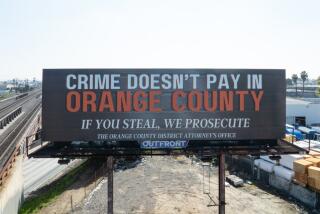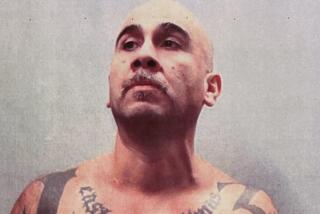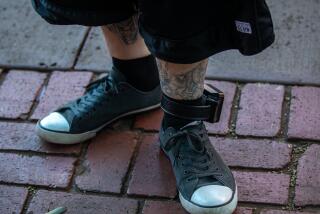Faith-based program keeps the lights — and phones — on for inmates
Inmates released from the Orange County Jail after dark are greeted by little more than dim street lights and cab drivers looking for fares.
Across the empty Santa Ana street, a recreational vehicle and a small floodlight offer a respite from the dark and the coldness of jail.
Waiting to offer a cup of coffee or a snack is Sal Lupercio, 28. He is a coordinator for the Lights On program, a ministry of the Society of St. Vincent de Paul.
“They’re being treated rough in there, and they come out here, and we treat them the complete opposite,” Lupercio said on a recent evening.
In 2004, Lights On was started to assist inmates released from 10 p.m. to 3 a.m. who would otherwise have nowhere else to turn, said Fred LaPuzza, director of the Diocese of Orange Office of Restorative Justice & Detention Ministry.
Lupercio said he and volunteers help 30 to 50 people nightly.
Lights On’s most popular service is charging cell phones. After a short charge, the former inmates are able to call someone to pick them up. There is also a phone to borrow for those who don’t have one.
“It’s so cool that they’re charging my phone right now,” said Christina Cardenas-Gibson, 39, of Anaheim.
She visited Lights On after spending three days in jail for a drug possession warrant.
It had been seven hours since she had eaten, and the table of donated chocolate chip cookies, croissants and bananas helped relieve Cardenas-Gibson’s hunger.
She and Consuelo Jarvis, 30, of Chicago — who said she was arrested on a warrant related to stealing a shopping cart — also accepted pairs of donated pants and basketball shorts.
Pete Andres, president of the Society of St. Vincent de Paul, said volunteers are fascinated by the stories they hear in exchange for a cup of coffee, a chair and a willingness to listen.
“We are able to provide a little bit of comfort, and people are just so gracious with their gratitude,” Andres said.
Volunteers regularly bring sweets or pizza.
“Suddenly, a Rice Krispies treat is a big deal to people,” Andres said.
As a sociology student at Cal Poly Pomona who hopes to become a parole officer, Lupercio is learning to better interact with those suffering from mental illness and addiction.
“It helps you understand what people are going through,” he said.
Lupercio recalled an older woman who had been arrested for trespassing and looked malnourished. He was able to convince her to call her niece for help.
She returned to the Lights On R.V. three months later, saying she had a job and appreciated the care he had shown her.
It’s this kind of outcome that makes the long nights on a dark street worth it.
“If this program can keep someone from heading down the street and committing another crime it keeps the community safe,” Lupercio said.
Langhorne writes for Times Community News
More to Read
Start your day right
Sign up for Essential California for news, features and recommendations from the L.A. Times and beyond in your inbox six days a week.
You may occasionally receive promotional content from the Los Angeles Times.






